Exploring the impact of social medias through Helter Skelter and Black Mirror’s Nosedive
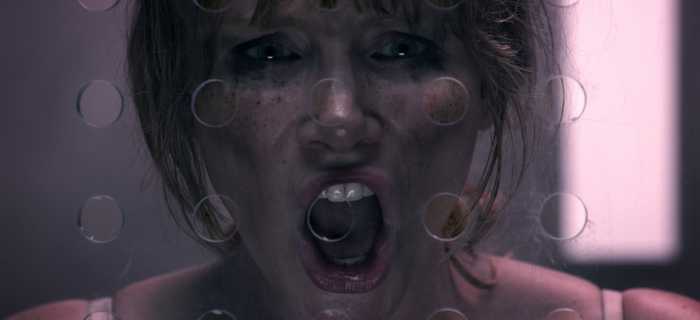
A word before we begin: A laugh and a scream are very similar”
Helter Skelter, by Kyoko Okazaki
From curiously accurated Instagram feeds to perfectly crafted tweets, social media has created a culture of self-presentation that can lead people to lose their sense of self in order to meet algorithmic requirements. Of course, our constant need for validation and approval contributes to this problem as people tend to feel that they need to be seen in a certain way in order to receive likes, comments and followers, rather than simply being true to themselves and their own interests and values. And they get lost along the way.
In today’s society, the pressure to maintain a perfect image and meet social media standards is on the rise. With the emergence of different platforms and the constant bombardment of photos, stories and feed updates, we are under an enormous pressure to conform to standards of beauty, success and popularity. The need for external validation has become an overriding feature of modern life, leading to a culture of comparison and competition that can have a profound impact on the mental health and well-being of current and future generations. Obsession with meeting social requirements can lead to loss of individuality, self-esteem issues and a focus on image over content, highlighting the need for a more mature and acceptable approach to self-image and self-worth.
Luckily, or to be fairer, because of art, we can always rely on audiovisual media and literature, which play an important role in shaping our perceptions of the world around us and help us to think critically about complex issues. They provide different perspectives, they are (often) aware of social issues and stimulate our critical thinking. And so, we engage with complex issues in a more meaningful way.
Kyoko Okazaki’s heavy but wonderful manga Helter Skelter and the Black Mirror episode “Nosedive” explore the results of image-perfect pursuits and the impact it can have on our sanity and society. Helter Skelter follows the story of Liliko, a famous model and actress who undergoes extensive plastic surgery to maintain her looks and status. In “Nosedive”, social networks play a significant role in shaping people’s reputation and status, with users rating each other in their interactions and behaviors. Like every other Black Mirror episode, this one is pretty bizarre.
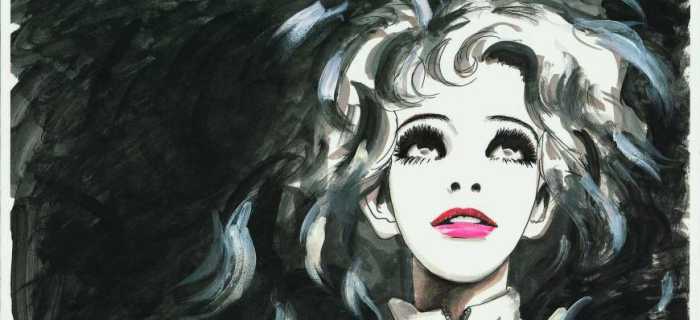
Both works explore the idea of external validation and the pressure to maintain a perfect image in a society that values appearance and status over originality. In Helter Skelter, Liliko’s obsession with her image leads her into a spiral of self-destructive behavior and fear of losing her status. In “Nosedive”, the protagonist Lacie’s desperate need for a high social score leads her to compromise her true self and ultimately face the consequences of living in a superficial and judgmental world. Our behavior feeds society’s broad view and this view pressures us into more and more abusive behavior towards ourselves. It’s a vicious cycle of self-deprecation.
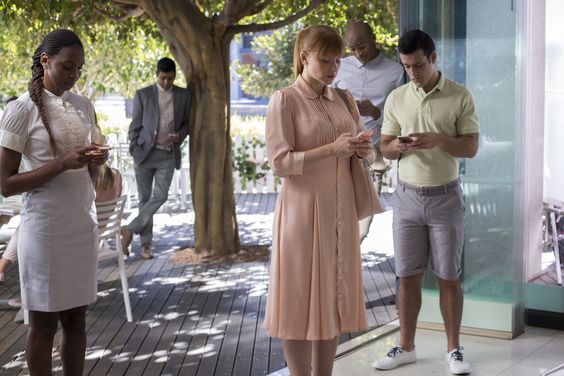
Obviously there’s nothing wrong with looking and feeling good, the problem is when image becomes the main focus at the expense of individuality and self-expression. And a lot of bad things can come from it. In Helter Skelter, Liliko’s physical transformation reflects the beauty standards imposed on women in Japanese society, while in “Nosedive” the social scoring system reflects how online behavior and image can shape our view of ourselves and people around us. The pressure to conform to these standards helps to create a superficial and judgmental society. And this is not restricted to Japan or a fictional narrative of a Netflix show. These are real problems that we face and discuss today.
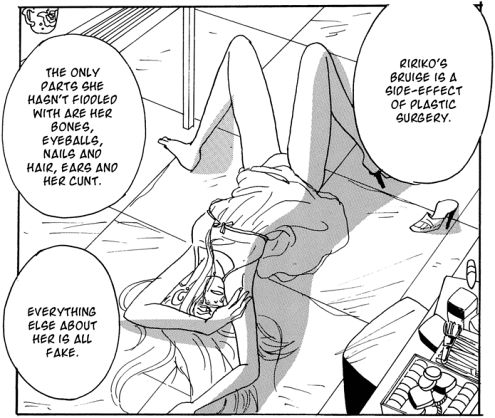
In both cases, the characters obsession with appearance and status leads to a gradual loss of their mental and emotional stability.
Liliko becomes increasingly disconnected from herself and loses touch with her emotions and personality. Her mental and emotional instability is reflected physically, making her grotesque and deformed.
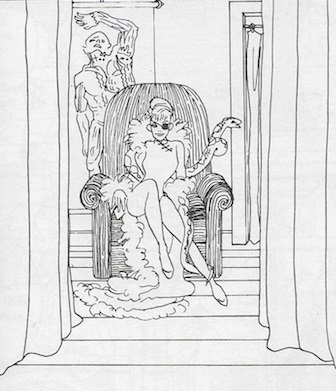
Likewise, Lacie becomes increasingly anxious and paranoid, constantly worrying about how others see her. Her mental and emotional instability is reflected in her breakdown at her best friend’s wedding, where she lashes out at everyone and loses complete control of her actions.
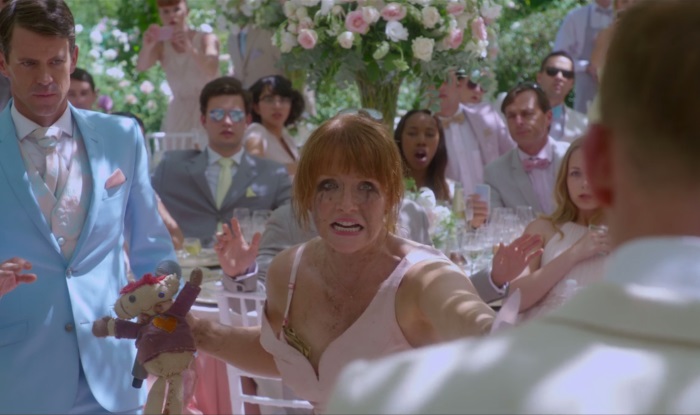
Who is the bad guy in all of this?
It’s no secret that the systems and algorithms used on social media and other platforms are designed to keep us engaged and connected in there. This systems are based on a gigantic mass of data and behaviors, such as the likes we give, the time spent on platforms and even who we follow. Netflix explains very well how this works in the documentary “The Social Dilemma”. It is worth checking.
Another way that systems trap us is by generating a sense of competition and comparison between people. And in a very subtle and ingenious way, for example, showing the number of likes on the posts, comments and encouraging its users to compare themselves and work to obtain greater numbers. And that’s what causes us so much anxiety and pushes us to meet these so-called “virtual requirements” and seek validation from people we don’t know or who don’t really care about us.
It’s the algorithms and this twisted system that drive Lacie crazy in Nosedive. And in Helter Skelter, Liliko is also hostage to another system that rules behavior: the fashion and entertainment industry. This environment uses Liliko’s image and her attitudes, transforming her into a symbol of beauty and success. Its image is massively circulated and celebrated, redefining the standards that whoever consumes that content will start to seek. And then we fall back into our vicious cycle.
Behind the scenes, we have Liliko becoming increasingly isolated, unhappy and unable to maintain any genuine connection. And so is Lacie, completely wallowing in a wild quest for external validation. No wonder, both lose their sanity.
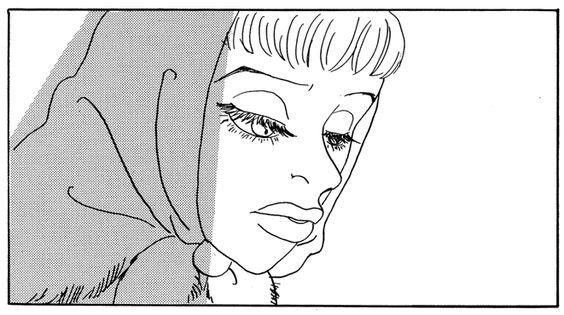
Okay, but so what?
We can draw a lot from the conclusions of both of these stories. Both Liliko and Lacie suffer the consequences of this exacerbated attempt to meet external expectations and it is very clear that the systems and institutions that perpetuate these expectations are not on a positive side in all of this. The algorithms, the advertisements, the industry, the colors, everything is done to keep us immersed and trapped in this system that empties us more every minute we spend connected.
Perhaps what we can really take away from these two narratives is, in addition to the need for a change in values in the social sphere, in search of more meaningful connections with each other, the need to think more critically about the environment in which we live. In this sense, the true benefit of stories like these is that we become capable of recognizing the traps that a greedy world puts in place to keep us trapped in a metaphysical universe that only generates negative impacts on our mental health. The real is what we touch, hear and feel, but to discover what is behind our connections, we need to disconnect.
What do you think? Leave a comment.








I am really fed up with people of my age (40) reacting with derision or disbelief when I say I don’t use Twitter or Facebook. And it’s mainly parents who express this derision; friends without kids seem to need it less. I have no problem with them using it, it’s just not for me. So many parents fear their kids using social media while refusing to admit it’s hold over their own lives. I have had to conclude that parents are a much bigger influence than peer pressure as to whether their kids use it.
I think it’s part of the desperation among so many parents that their kids aren’t left behind. It’s they who buy the internet-enabled devices and give them out, they who allow underage kids to sign up to Facebook. Their own fears about being left behind by technology are affecting their parenting. Perhaps that’s why so many teenagers are quietly abandoning Facebook.
The peer pressure you mention was a huge part of how the ‘social’ aspect of scoring had become fundamentally institutional, to the ultimate point of the right to life (healthcare), in that not-so-far future.
A warning indeed!
When I was a teenager, if facebook had been around and my parents tried to ‘friend’ me, I’d deactivate my account in one hot minute.
This is what you call; ugly beautiful.
I think Helter Skelter is great but Pink is even better.
I like Black Mirror, but I sometimes wish the directors and writers had the guts to be a little more subtle at times. This episode got away with its “in your face message” thanks to some amazing art direction and great acting, but I hope future episodes recognise that audiences don’t always need the moral of the story spelt out letter by letter.
Bizarrely these days you can leave ratings for tube stations and crown courts. The latter I’ve never had a choice of which one where my presence has been required (jury service & witness).
Upvote this comment. I need the numbers for my ego. 😉
I did. When you look at the upvote, can you see it melt away into insignificance or will you cherish it? It was sent with love and should be cherished accordingly.
Wish granted.
I did. All you had to do was ask.
This is as meta as it goes. Love it.
See also “App Development and Condiments,” the episode of Community where a trending app turns a community college into a caste system. In the end, as I recall, the hero brings the whole system down by pointing out that the app itself is beyond judgment.
I find this whole article incredibly interesting, but my question is is disconnecting really the answer? Even if you personally disconnect from social media the culture is still there. It also discredits the real and tangible benefits and interconnectivity social media can bring. I think individually we should all contribute to a more transparent culture.
Hi, Alex!
I got your point 🙂 Actually, the most difficult part about this article was think about an end. We all have our responsibility as individuals, as you said. My suggestion for disconnection was more into how we individually can reconnect with what is trully real? I dont know, maybe it became too open.
Thank you for your input, anyway 🙂
That is an interesting point. I do feel that social media can create a barrier between our ideal selves and our real selves, a persona we create and perpetuate through these apps. Connecting back with ourselves, fusing the identities we have built into something more true and honest.
Connecting with what is real in our world is also something I completely agree with. Pictures and captions don’t do justice to real experiences we can have over the course of our lives.
Social media drives a wedge between us and everything beyond the screen, even ourselves. Very insightful, Allan 🙂
Nosedive neatly blended a great commentary on the totalitarianism of big data, social media and human nature’s instinct to protect our reputational value with a genuine personal story.
Fantastic stuff.
Ive always been incredibly bad at protecting or even building a reputation. I don’t really like lying and that is all that it has ever seemed like to me. I’ve got some skills that people want to pay me for and gathered a few people who see some value in me. Not sure it is human nature. I suppose I don’t like people to think bad of me.
I’m not an expert or anything but I believe an interest in one’s reputation is generally accepted as a result of human evolution.
I thought there were some really iffy parts. The beginning dragged a lot. It felt like I was being hit over the head with the concept of this near-future. The kitchen dialogue between Lacie and her brother before she left for the wedding was really, really poor.
I liked the end though. The theme of our humanity in conflict with technology makes Black Mirror great. The sense of catharsis was wonderful. Have to say though, the endings that leave you in a lot of discomfort are my favorite.
If anything Facebook and other social media have shown just how vacuous the average human is, and unnecessary too.
I don’t know much about the young folk, but I suspect that ultimately there will be some sort of cooling down amongst pre-millenials with regards to social media. But is it possible that in ~10 years time, social media will be an automatic extension to life? I can’t imagine what it must be like to be at school now and be crap at social media. Would that make one a social pariah?
Those of us who are Twitter and Facebook refuseniks are already seen as untermensch by most of those who live their lives vicariously through it. If only they could see that most people aren’t interested in what they post on Instagurn.
Great read. Anyone up for some lofty further reading should check out René Girard and his Mimetic Desire theory.
I admire CB’s writing, but Black Mirror episodes remind me of those horrible TV dramas from the 80s imagining life after nuclear war or terrible diseases (i.e. allegories for nuclear war). Admirable but not fun, and guaranteed to give me nightmares because they seem so plausible. I can’t honestly put myself through watching any more, glad as I am that he is producing innovative TV.
I get that Helter Shelter is supposed to give a lesson but I don’t like everything about this book at all. The art work is not great. The plot’s too sexual and the MC’s so engrossed with herself. The only character that I like is just too pitiful she can’t even defend herself. Everything is just so pathetic and frustrating. What’s to like?
When beauty can make people becoming monster.
Thank God someone is talking about Helter Skelter! It’s such a good work and has unfortunately fallen under the radar
This article makes an important point about social acceptance and modern appearance values. Hopefully, viewers who watch Helter Skelter and the Black Mirror episode “Nosedive” can come away with the hope that life has hope for everyone, not just those trapped in the system.
There is a great article on the film adaptation of Helter Shelter here on The Artifice: https://the-artifice.com/helter-skelter/
We love this drug not only because we are vain but because its one of the few things left we can actually, directly control.
The system we made brings us everything, and in doing so robs us of reality. Humans have created a void and this is how we’ve filled it, with meaningless, 2 dimensional ‘affirmations’ that our lives, and thus our world, is what we want it to be. In a way image-consciousness, from fashion and other clique-cultures to online presence, is not unlike prayer, in which we absolve ourselves of evils we have knowingly committed through ritual and instead of introspecting, project our ideas of our proximity to perfection (god or god-likeness) into our ‘communities’ and back at ourselves, shaping with fervent utterances our perceived, desired and projected self-image.
Loved it. Nailed social media anxiety.
I’ve been a long time Black Mirror fan but this episode wasn’t quite up to scratch.
The concept was incredible but for some reason I don’t think the execution was deserving of the idea. The set designs / costumes were fantastic and couldn’t be faulted.
This is a manga that sticks with you. I’ve read it twice.
Helter Shelter is told very elegantly. Plastic surgery is, like refurbishing your house, plunging headlong into a rabbit hole of eternal self-destructive upgrading and obsessive maintenance.
Lilliko is the embodiment of liquid smooth.
Lovely article. In the end there is no solution, no great morale. The circle continues, a mirror of our society and ourselves in the most extreme form. And that is true horror.
The best episodes of Black Mirror are the ones that paint a believable picture of society in the future. Something we could imagine happening – Shut Up and Dance being a good example from this series. The premise of a world entirely consumed and controlled by goody-goody instagrammers was just a bit laughable, and in no sensible person’s mind is it ‘five minutes away.’
It portrays human beings as unable go tell reality from unreality, dont think we’ve reached that depressing place quite yet, hope we never do.
I take it you don’t know many teenagers then?
An incredible manga about desire and transformation!
Read HS recently and I’m looking forward to reading more of Okazaki’s work.
I did enjoy the consequences of Liliko’s addiction to plastic surgeries.
My only gripe is that sometimes the art isn’t clear and it makes it hard to tell what is happening.
As a transfem there’s just something about Ririko’s character that makes me see her in myself if İ were to both pull through and let myself go a little more.
Okazaki manages a perfect balancing act were Liliko, (and women in their hunt for beauty) is never demonized despite her deplorable acts, but isn’t excused either by the society that (literally) shaped her.
There is intense societal commentary in both of these works.
This manga was deep. A fantastic, explicit account of how beauty can be all-encompassing and destructive.
Lavish hysteria at its finest.
Oswald Spengler, The Decline of the West (published in English in 1926), addressed to some extent the decline of originality. I wonder how pervasive that belief was at that time, contrasted with what you describe here. Maybe social media as an outgrowth of new technologies just amplifies a human trait that has been around a long time.
An insightful view into the complexities and pressures of social influence. T
Good read. Perhaps the best would be to strike a balance, because fully disconnecting can be hard to do in today’s society for various reasons.